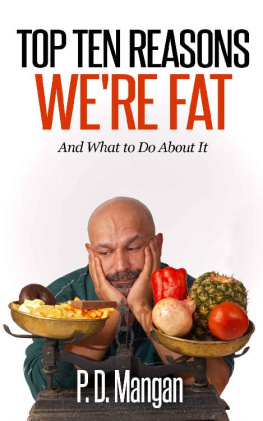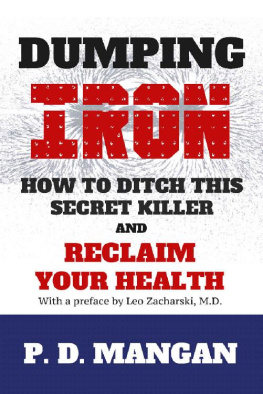P. D. Mangan - Top Ten Reasons We Are Fat
Here you can read online P. D. Mangan - Top Ten Reasons We Are Fat full text of the book (entire story) in english for free. Download pdf and epub, get meaning, cover and reviews about this ebook. year: 0, genre: Science. Description of the work, (preface) as well as reviews are available. Best literature library LitArk.com created for fans of good reading and offers a wide selection of genres:
Romance novel
Science fiction
Adventure
Detective
Science
History
Home and family
Prose
Art
Politics
Computer
Non-fiction
Religion
Business
Children
Humor
Choose a favorite category and find really read worthwhile books. Enjoy immersion in the world of imagination, feel the emotions of the characters or learn something new for yourself, make an fascinating discovery.
- Book:Top Ten Reasons We Are Fat
- Author:
- Genre:
- Year:0
- Rating:5 / 5
- Favourites:Add to favourites
- Your mark:
- 100
- 1
- 2
- 3
- 4
- 5
Top Ten Reasons We Are Fat: summary, description and annotation
We offer to read an annotation, description, summary or preface (depends on what the author of the book "Top Ten Reasons We Are Fat" wrote himself). If you haven't found the necessary information about the book — write in the comments, we will try to find it.
Top Ten Reasons We Are Fat — read online for free the complete book (whole text) full work
Below is the text of the book, divided by pages. System saving the place of the last page read, allows you to conveniently read the book "Top Ten Reasons We Are Fat" online for free, without having to search again every time where you left off. Put a bookmark, and you can go to the page where you finished reading at any time.
Font size:
Interval:
Bookmark:
TopTen Reasons We're Fat
AndWhat to Do About It
P.D. Mangan
PhalanxPress
Disclaimer
The reader should consult a qualified medicalprofessional before adopting any of the suggestions in this book,starting a diet or exercise program, or taking any vitamin orsupplement product. The author is not a medical professional and this book does notconstitute medical advice. This book contains the opinions and ideasof its author, who is not engaged with rendering health services withthis book, and it is not intended to be a substitute for qualifiedmedical care. This book is solely for information and entertainmentpurposes. The information presented here is believed to be accurate,but the author makes no warranties regarding its accuracy, and someinformation may have become outdated. The author shall not be liablefor inaccuracies nor for any actions taken as a result of theinformation and opinions presented in this book. The authorspecifically disclaims all responsibility for any liability, loss, orrisk, personal or otherwise, which is incurred as a consequence,directly or indirectly, of the use and application of any of thecontents of this book.
By downloading and/or reading this book you declare thatyou have read the above statement and agree with it.
Copyright 2015 by P. D. Mangan, All Rights Reserved.This book may not be copied or reproduced in whole or in part whetherin digital or printed format without express written permission fromthe author.
Contents
Preface
Whatyou can control, and what you can't
Whyhave so many of us become overweight and/or obese? That's a questionwe'll be looking at in this book, which focuses on concrete stepsthat anyone can take to lose fat or maintain a lean weight. Thosesteps ought to be within the control of anyone who puts their mind toit. Losing weight does take effort, though it's my belief that it canbe done relatively painlessly.
However,there are some things that are not in our control. Genetics, forinstance.
Geneticstudies of identical twins have yielded figures of from 40 to 75%heritability of obesity. This means that a large part of thevariation in obesity between two people will be largely due to theirgenetic makeup. Studies of identical twins that were separatelyadopted or otherwise raised in different families have shown thatthese people have virtually zero correlation in weight with themembers of their adopted families, but a high correlation with thetwin whom they were not raised with.
So,genetics is a powerful factor in obesity. But genes do not act in avacuum; they always interact with the environment. The studiesshowing that genetic factors matter a lot assume that the environmentis the same among the people being studied, but that may very wellnot be the case. Gene-environment interactions are what matter, sinceif there's not access to enough food to make you fat, or otherconditions intervene to prevent that, such as having to perform heavylabor continually, all the genes in the world can't make you fat.
Twothings make the genetics argument for obesity less than compelling not that I doubt its truth. One is that genes can't explain theobesity epidemic that has arisen since the 1970s (or thereabouts),since the genetic makeup of society hasn't changed much since then.Evolution by natural selection can sometimes act quickly, but notthat quickly. No, what had to have changed is the environment thatthose genes interact with. The environment that has changed mainlymeans the food environment, although other factors have changed too,as we'll see.
Theother reason for not paying too much attention to the geneticargument is that it does next to nothing to help an overweight personlose weight. If anything, it serves as an excuse: My genetics arebad, therefore I'm doomed to be fat. Mmmm, donuts! No, you wereborn with the genes you have and until we have robust, cheap geneticengineering, the same ones will remain with you until you die. If youfind that your particular gene-environment interaction means that youare overweight, then your environment must change.
Thisis not to say that everyone will have the same success at losingweight and maintaining weight loss that others might have. On anygiven diet, even the best weight loss diet in the world, some peoplewill weigh more than others, will have a greater amount of fat tissuethan others, and this is due to genetic factors, other things beingequal. This knowledge can save the overweight from the dangers ofself-deprecation; it isn't always because you're not trying hardenough, though at times it may well be.
Aso-called slow metabolism likely can contribute to being overweightor obese, and genes also control metabolism to a great degree. Somepeople just have energy to burn, and their body temperature might besignificantly higher than those with a slower metabolism. Hormonesalso play a role here, especially thyroid hormones, so if you do havea slow metabolism, along with other symptoms like fatigue, a visit toa doctor may be in order. A doctor can determine whetherhypothyroidism exists and can prescribe thyroid replacement. For somesubset of the overweight, this may be all that's needed to loseweight. But you can do a number of things to boost metabolism, shouldyou have a slow one, including a change of diet and exercise.
Medicationscan also contribute to being overweight, and these includeantidepressants, corticosteroids, oral contraceptives, diabetesdrugs, antihistamines, and beta blockers. A rapid weight gain ofseveral pounds in a month, especially after recently starting aparticular medication, could be a sign that the medication is causingit. How much one can do about this will likely reside in particularcircumstances, like whether one can readily do without the drug, whatthe doctor has to say about if it's a prescription med, or whetherother meds can be substituted. So drugs represent a case where youmay or may not be able to change circumstances to be more in yourfavor.
Obesityin childhood causes, or should we say correlates with, a high risk ofobesity in adulthood. In fact, birth weight correlates with obesity;babies in the highest quintile (top fifth) of birth weight had doublethe risk of obesity in adulthood as normal weight babies. Of course,the infant, the child, and the adult share 100% of their genes, sodisentangling this effect from that of genetics is difficult.Moreover, one can't change the weight at which one was born or duringchildhood. This is not a counsel of despair, but it should be takeninto account by anyone wanting to lose weight. Most books on thetopic handily omit such information, the message being that justfollowing whatever method the book wants to promote for weight losswill work. Not necessarily. Some people will have to work much harderand exert more discipline for every pound they lose, and they mayhave to settle for never being as lean as they would like. It can bedifficult to know when you must try harder, and when you've done allyou can and it isn't working well, and this will be highly dependenton individual circumstances.
Certainpsychological factors correlate with obesity, factors like depressionfor example. Some evidence points to depression as a cause and not aconsequence of excess weight, so where depression and obesitycoincide, the depression must be treated.
Someother factors have been shown or thought to be involved with obesity.A current popular item in this field is the composition of the gutmicrobiota, that is, the bacteria that reside in our intestines.These may have a very real effect on our tendency to gain weight, butchanging them requires changing what we eat, as the amount and typeof these bacteria change with the type of food we eat.
Theseare some of the things we cannot control, or have only limitedcontrol over. But many, many things exist that we can change, such asbehavior, our food environment, how much we exercise, whether wesleep well, and so on. Maybe the obesity epidemic arose fromdisparate factors that many people have no control over. We can'tanswer that question definitively, although I believe the answer isthat it did not, but the fact that many people successfully loseweight and keep the weight off tells me that controllable facets ofthe environment are very important.
Next pageFont size:
Interval:
Bookmark:
Similar books «Top Ten Reasons We Are Fat»
Look at similar books to Top Ten Reasons We Are Fat. We have selected literature similar in name and meaning in the hope of providing readers with more options to find new, interesting, not yet read works.
Discussion, reviews of the book Top Ten Reasons We Are Fat and just readers' own opinions. Leave your comments, write what you think about the work, its meaning or the main characters. Specify what exactly you liked and what you didn't like, and why you think so.










